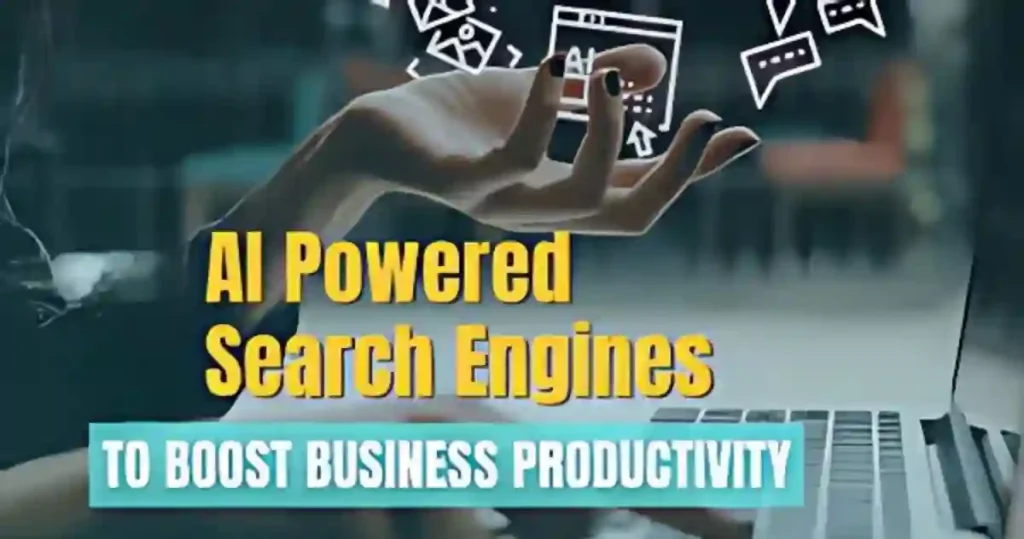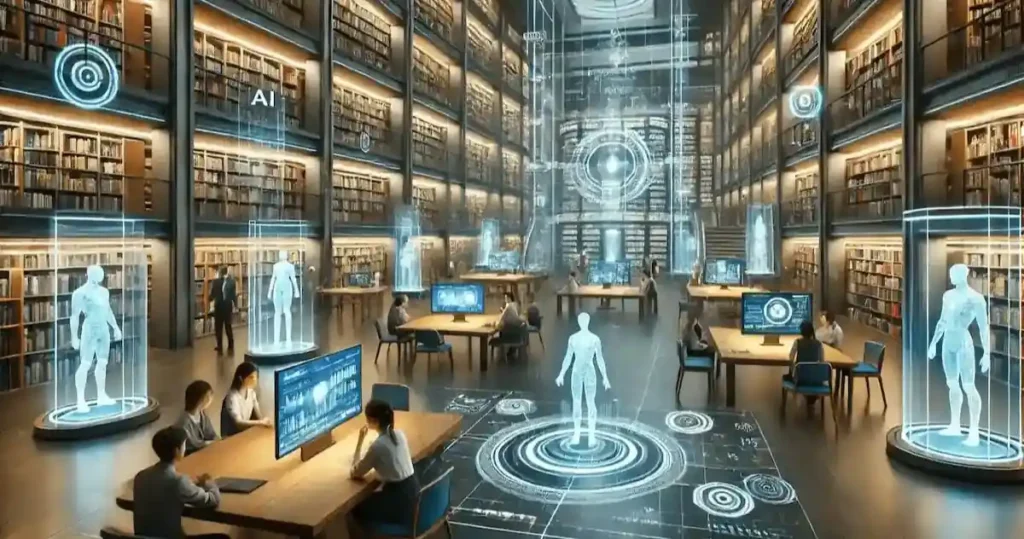Ever wanted to ask a robot AI in libraries for help?
With AI, this dream is becoming a reality!
AI is making libraries much smarter and better.
Imagine all the cool things you could do—like search for books with a friendly chatbot, and find books in seconds.
Even have the library understand what you mean when you ask for something.
AI is transforming the way we look for and use information, and it’s super exciting!
So, ready to visit 16 Top Free AI Tools for Teachers for Better Classrooms 2025?
Let’s explore what AI can do and how it’s changing libraries for you!
Key Takeaways
- AI-powered search engines and discovery tools are making it easier to find what you need. They offer personalized suggestions and understand natural language better.
- AI is making library tasks like cataloging and managing metadata faster and more accurate. This makes libraries more efficient.
- Virtual assistants and chatbots are helping with research. They guide users and answer questions right away.
- It’s important to use AI responsibly in libraries. We must follow ethical practices and protect data privacy.
- AI is changing libraries in big ways. It’s making them more personal and efficient, preparing for a future where finding information is easier and more tailored to each person.
AI is making libraries smarter, more responsive, and focused on the user.
But how can AI devices help libraries, and which AI libraries are best for data prep?
Find out and see how AI is changing libraries for the better.
Introduction to AI in Libraries

Public libraries are using AI technology to make things better for users and to work more efficiently.
AI can help libraries serve their communities better and keep up with new tech.
This is a big step forward.
Libraries want to make things better for users.
They use AI to help people find what they need easily.
Natural language processing makes it easier to find information, even with tricky questions.
But using AI in libraries comes with challenges.
Some jobs might change or even disappear.
Librarians need to learn new skills to keep up with AI.
Also, libraries must think about ethics and privacy when using AI.
They must use AI wisely and protect user data.
This keeps the community’s trust.
Despite the hurdles, AI can make libraries work better.
It lets librarians do more important things.
As libraries move into the digital age, AI will be key to meeting community needs.
AI-Powered Search Engines and Discovery Tools

In today’s world, libraries are using new tech to change how people find and use their collections.
They’re using AI to make search engines and tools better.
This makes it easier for people to find what they need.
Personalized Recommendations
AI search engines in libraries give users personalized tips.
They look at what you’ve searched for and your interests.
This way, they suggest books or research that fits what you like.
This makes finding information faster and more fun.
It also helps you discover new things you might not have found on your own.
Natural Language Processing for Information Retrieval
AI is also making libraries better with natural language processing (NLP).
NLP lets search engines understand what you mean when you ask a question.
This means you can search in your own words and get answers that really match what you’re looking for.
AI search engines and tools are making libraries better for everyone.
They help people find what they need easily.
As libraries keep up with new tech, these tools will be even more important.
| Feature | Features |
|---|---|
| Personalized Recommendations | Tailored suggestions based on user preferences and browsing history |
| Natural Language Processing | Intuitive search experience with better understanding of user queries |
| Efficient Information Retrieval | Faster and more accurate access to relevant resources |
Automating Library Tasks with AI

Artificial intelligence (AI) is changing libraries. It helps automate tasks, making libraries more efficient.
Librarians can then focus on important work.
AI is big in resource acquisition and inventory control. It looks at what people like and what’s new.
This helps libraries buy the right books and keep their collections fresh.
AI also changes how libraries catalog and manage metadata.
It makes cataloging faster and more accurate. Librarians can then do more creative work.
| Characteristics of Automated Library | AI-Powered Capabilities |
|---|---|
| Resource Acquisition and Inventory Control | Analyze usage patterns, user preferences, and market trends to assist in purchasing decisions and maintain an optimized inventory |
| Cataloging and Metadata Management | Automate the cataloging process, extract relevant metadata, and ensure consistent organization of the library’s holdings |
| Patron-Facing Services | Implement virtual assistants and chatbots to provide personalized assistance, answer queries, and facilitate self-service tasks |
In patron-facing services, AI is making a big difference. Virtual assistants and chatbots help users.
They answer questions and help with tasks, so librarians can do more.
Libraries are getting better with artificial intelligence in library services.
They work smarter, serve users better, and open up new chances for teamwork and creativity.
AI shows how libraries are adapting to today’s needs.
AI-Driven Cataloging and Metadata Management
In today’s world, libraries use AI to make cataloging and metadata management easier.
AI-driven cataloging helps libraries organize and describe their collections better.
This makes it easier for people to find and use library resources.
Computer Vision for Digitization
When libraries digitize their books, computer vision is key.
AI can scan and recognize images, pulling out important info like titles and authors.
This saves librarians time, letting them do more important work.
Automated Subject Indexing
AI is also changing how libraries index subjects.
AI can look at what’s in the books and assign the right tags.
This makes it easier for people to find what they need.
It’s a big step forward in AI for information retrieval and personalized recommendations in libraries.
By using AI-powered search engines and automating library tasks, libraries can improve how they serve users.
This makes library collections more accessible than ever.
“AI-driven cataloging and metadata management are revolutionizing the way libraries organize and share their resources, ultimately empowering users to find the information they need with greater ease and efficiency.”
AI in Libraries
Libraries are changing with the digital age. AI is making big changes in how we find, keep, and manage information.
It’s making libraries better places for everyone.
AI is making AI-enhanced user experience in libraries better.
It helps you find what you need with ease.
You can search in your own words and get great results.
AI is also key in AI for preservation and digitization.
It helps keep old books and papers safe.
It makes it easier to find and use these digital treasures.
AI makes AI-powered library workflows more efficient.
It helps with tasks and keeps things running smoothly. Librarians can help more people and do more interesting work.
But AI raises ethical considerations and data privacy concerns.
Librarians must be careful with AI.
They need to keep data safe and use AI wisely.
| AI Application | Impact |
|---|---|
| Personalized Recommendations | Enhances user experience by providing tailored suggestions based on individual preferences and browsing history. |
| Automated Digitization | Streamlines the preservation of fragile and historic materials, ensuring their long-term accessibility. |
| Automated Cataloging | Improves the organization and discoverability of digital assets, making it easier for patrons to find the information they need. |
Libraries are getting better with AI.
The future looks bright for finding and keeping information.
With careful use, AI can make libraries better for everyone.
Virtual Assistants and Chatbots
In today’s world, virtual assistants and chatbots are key in AI-powered libraries.
They change how we find and use information.
These tools help users and change what librarians do, making way for the “AI librarian.”
AI-Enabled Research Support
Virtual assistants in libraries use AI to understand what users need.
They give personal help and make finding info easy.
It looks at what users search for and suggests the best resources.
AI will help libraries offer better support all the time.
It answers questions and guides users.
This makes libraries more personal and helps users find what they need easily.
“AI-powered virtual assistants are transforming the library landscape, enabling users to discover information with unprecedented ease and precision. The ‘AI librarian’ is redefining the future of research support.”
As AI gets better, we’ll see more virtual assistants in libraries. They will be great helpers, making it easy to find lots of information.
Ethical Considerations and Data Privacy
Libraries are using new tech like machine learning and AI.
They must think about ethics and privacy.
It’s important to keep trust and follow library values.
Ensuring Transparency and Accountability
AI can hide biases and make decisions we can’t understand.
Librarians need to make sure AI tools are clear and fair.
They should watch these tools closely to fix any problems.
Protecting Patron Privacy
AI in libraries raises big privacy questions.
Libraries must protect user data carefully.
They need strong privacy rules, encryption, and who can access what.
Promoting Ethical AI Practices
Libraries can help make AI better. They can work with tech companies and experts.
This way, they can make sure AI is fair and respects everyone’s rights.
| Key Ethical Principles for AI in Libraries | Description |
|---|---|
| Transparency | AI systems should be designed and implemented with clear documentation, explaining their data sources, algorithms, and possible limits. |
| Accountability | Libraries must have ways to check and fix AI problems like bias and unfairness. |
| Privacy | Libraries must protect user data well, using strong privacy rules, encryption, and access controls. |
| Fairness and Inclusivity | AI tools should help everyone have equal access and not discriminate against certain groups. |
Libraries can make sure AI is used correctly by focusing on ethics and privacy.
This way, they keep their values and community trust.
“The ethical and responsible use of AI in libraries is not just a box to be checked, but a fundamental principle that must guide our entire approach to technology implementation.”
Frequently Asked Questions
Will AI replace librarians?
AI is changing libraries, but it won’t replace librarians.
AI helps with tasks and finding information.
But librarians are key to curating collections and helping patrons.
How can AI in Library devices be utilized to improve the facilities of a library?
AI devices can make libraries better.
They help with tasks and make spaces more efficient.
For example, AI can help find resources and manage inventory.
What are the most popular AI libraries for data preparation?
Top AI libraries for data include TensorFlow, Pandas, and Scikit-learn.
They help clean and prepare data for AI use.
How should public libraries leverage AI technology?
Public libraries can use AI to improve services.
AI can help with search and other tasks.
But libraries must think about ethics and values.
What are the challenges of AI in libraries?
Using AI in libraries has challenges.
These include privacy and ethics. Librarians must also ensure AI is fair and accessible.
How are robots using AI in libraries?
Robots help with tasks in libraries.
They sort books and help patrons.
But their use is limited to simple tasks.
Conclusion
AI in Libraries is changing how we find and use information.
It makes searching easier, helps with cataloging, and even provides personalized book suggestions.
With AI, libraries are becoming faster and more user-friendly.
However, we must use AI responsibly and protect people’s privacy while enjoying these benefits.
Check out: “AI Higher Education: Top Benefits for Schools in 2025” to learn more.
AI is shaping the future of libraries, and it’s exciting to see what’s next!
